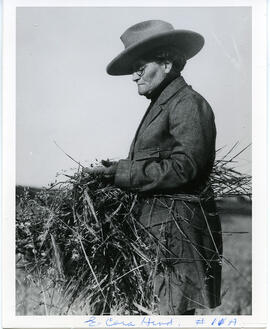Image of E. Cora Hind, Editor, Winnipeg Free Press, checking grain in a field.
Bio/Historical Note: Ella Cora Hind, journalist, agricultural authority, activist and suffragist (1861-1942), was an acclaimed grain expert, a champion of women’s rights and an advocate for the franchise. Hind helped her grandfather on the family farm, where she learned about tending livestock, sowing wheat and judging when crops are ready to harvest. She was initially homeschooled but began attending classes at the age of 11 when a school was built nearby. During high school, Hind considered a career in teaching and wrote the exam. However, after failing the algebra section, she decided to become a journalist. Accompanied by her aunt, Ella Cora Hind boarded a train for Manitoba in 1882, travelling west for career opportunities. Armed with a letter of introduction from an uncle, Hind confidently entered the Manitoba Free Press office in Winnipeg. Editor William Fisher Luxton warmly welcomed her to the office but was astonished when she asked for a job as a reporter. Luxton refused. There were no women on staff, and he would not change policies. Hind left, feeling disappointed; however, she was not defeated. Hind heard about a brand-new office machine, the typewriter, and immediately rented one. She taught herself the two-finger hunt-and-peck method. After a month of intensive practice, she returned the machine and left with a job prospect. Shortly after, Hind secured a job working for a lawyer named Hugh John Macdonald (the son of Prime Minister Sir John A. Macdonald, who later became a politician and premier of Manitoba). Macdonald’s law office purchased the first typewriter in Winnipeg. Hind, the only typist west of the Great Lakes, was hired at a salary of six dollars a week. In 1893 Hind established Western Canada’s first public stenography bureau. At the same time, she was following developments in prairie farming. Among others, Hind’s clients included farmers, from cattlemen to grain farmers, and brokers. These men enjoyed working with Hind, who had an in-depth knowledge of farming due to her upbringing. Hind often submitted articles on agriculture to the newspaper under her preferred byline, E. Cora Hind. She soon became known as a grain expert. In 1901, editor John W. Dafoe of the Manitoba Free Press offered Hind a job as an agricultural editor. Tramping through fields to examine crops, she earned an international reputation as an agricultural journalist and “the oracle of wheat” for her accurate harvest yield predictions. She was also renowned for her non-traditional work wardrobe of riding breeches, high leather boots and a Stetson hat. Farm inspections later took Hind on travels throughout Canada and abroad. In 1924 alone, she travelled more than 10,000 kilometers to survey crops. Hind was a founding member of the Winnipeg branch of the Canadian Women’s Press Club. At the time, female journalists were not allowed to become members of the Canadian Press Club. Hind used her status to advocate for women in journalism and in the community.
Hind became involved in temperance movements shortly after arriving in Winnipeg in 1882. Her first job as typist for lawyer Hugh John Macdonald introduced her to a range of contacts and situations, including the desperate need for social reform. Unbearable living conditions, drunkenness, crime and child and spousal abuse were common in Winnipeg. Hind and her aunt joined the Women’s Christian Temperance Union (WCTU) in Winnipeg to press for prohibition. In 1894 she was a founding member of the Manitoba Equal Franchise Association with prominent suffragist Dr. Amelia Yeomans, who became the first president of the club. Hind composed and typed fiery suffrage speeches. In 1912 Hind co-founded the Political Equality League (PEL) with suffragist friends Nellie McClung and Lillian Beynon Thomas. Fighting for rights for all women, the core members of the PEL were professional women, such as journalists and physicians. Using education, speeches and satire, the PEL attracted public attention by holding a “mock parliament” in January 1914. Hind was part of the play’s cast, along with McClung and Thomas. The work of Hind and other suffragists ignited historic change. In 1916 Manitoba was the first province to grant women the right to vote and hold office. In 1935, the University of Manitoba awarded Hind an honourary Doctor of Laws degree. Seven years later, E. Cora Hind died at age 81. In 1997, a plaque was erected in Winnipeg, designating the journalist and suffragist as a National Historic Person.



